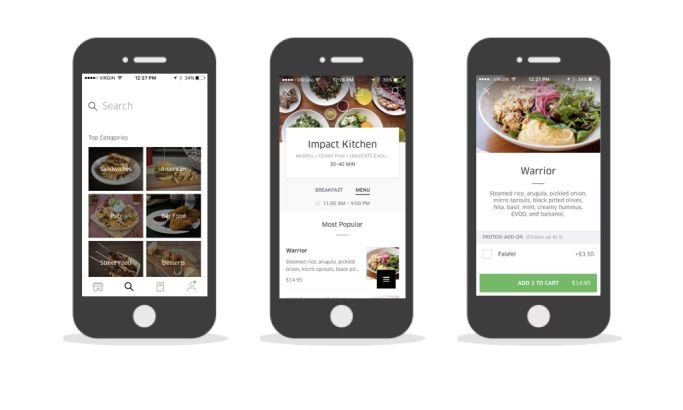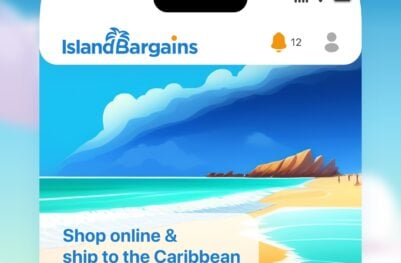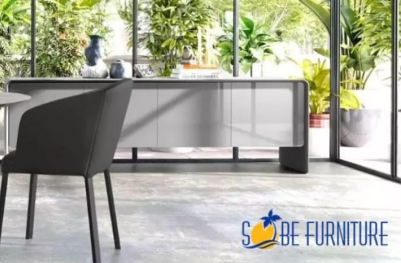- Developers
- Developer Blog
- Mobile App Development
- How to Build a Food Delivery App like Uber Eats?

profile

By Faiza Khalid
Verified Expert
5 years of experience
Faiza is a CIS engineer with a keen interest in software development, AI research, and technology writing.
Are you wondering how to build a food delivery app?
The global food delivery application market is expected to reach 62.836 billion USD by 2030. Uber Eats holds 24% of the total US food delivery app market.
According to statistics, Uber drivers completed 6.3 billion trips in 2021 compared to 6.9 billion in 2019. This indicates the potential for new startups to make their mark in the growing food delivery app market.
Build a Food Delivery App like Uber Eats
To build a custom food delivery app like Uber Eats, you should take the following steps:
Perform Target Market Research
The first and foremost step is to understand your target market. You would need to perform market research to get insights into the current market trends and understand target-audience preferences.
You should find answers to the following questions:
- Who are your competitors, and what is their business model?
- How do they provide value to the end users?
- What are the demographics of your target audience?
- What do they love and resent the most about the delivery apps currently available in the market?
Such a detailed market analysis would help you figure out the pain points of your target users and provide a solution to their problems via your food delivery mobile app.
Develop Food Delivery App Development Team
You would require a professional mobile app development team to build a custom food delivery app. You should hire for the following roles:
- A project manager helps you plan the app development lifecycle, assign development tasks to team members, keep track of the project’s progress, perform cost and time estimates, etc.
- A business analyst with experience in the mobile app industry helps you understand your business market and works with the project managers to build a mobile app as per user requirements.
- A UI/UX designer designs an attractive and intuitive mobile app user interface.
- An Android developer develops a native Android app.
- An iOS developer builds a native iOS app.
- A web app developer develops a cross-platform mobile app.
- App tester tests your mobile app for bugs and errors.
Decide Project Scope
Now, you would decide the scope of your food delivery app project that can compete with Uber Eats. A good starting point is to study the working and business model of Uber Eats.
App Business Model
Uber Eats follows a three-way food delivery model that connects restaurants, customers, and delivery service providers.
Restaurant owners list their restaurants on the Uber Eats app along with their menus and prices. Customers can view these listings and place their orders. Restaurants connect with a rider or delivery agent to deliver food orders.
Another traditional food delivery model that food delivery apps work on is an Order-only platform where the food delivery app service does not provide delivery logistics to restaurants. Restaurants either offer only takeaway services or manage their own food delivery services.

Get a complimentary discovery call and a free ballpark estimate for your project
Trusted by 100x of startups and companies like
We recommend you choose the business model depending on the type of service you want to deliver to the consumers and food business owners via your food ordering app.
App Features
You would also decide the features you want to build in your own food delivery startup app. Uber Eats offers the following functionalities for its three types of app users:
- A customer panel with the following features:
- An easy sign-up and login, preferably with integrations with social media accounts like Facebook and Twitter, for a swift sign-up process;
- A user profile with information about the address, contact details, etc.;
- Search option via cuisines categories, location, etc.;
- Order placement, tracking, and cancellation process;
- Orders history for easy reorders;
- Multiple payment options.
- A restaurant panel with the following features:
- Easy sign-up and log-in;
- Option to upload menu with food details and images;
- Easy menu edit option;
- Orders management with features like notification for a new order, updating order status for customers, etc.
- Delivery management.
- A delivery service panel with the following features:
- Easy sign-up;
- Notifications for new orders with address;
- Option to set availability;
- Navigation feature;
- Delivery process summary;
- Payment details.
These are a few of the many features that your food delivery app should have to ensure a seamless user experience. The important point is to make your app stands out from the rest. You would need to offer a feature or app experience that sets you apart from the competition.
You would finalize your app functionalities and prepare a systems requirements specification document with the help of your project manager and business analyst. The SRS document would help your mobile app developers create a food delivery app as per your project requirements.
Choose an App Development Methodology
Your project manager would assist you in choosing and implementing a suitable mobile app development methodology. Mobile app development usually follows agile development methodologies like Scrum and Kanban.
The Scrum technique divides the app development process into multiple iterations, called sprints. Each sprint delivers a deployable app feature at the end of each sprint.
Scrum teams are cross-functional and follow close collaboration. Daily standup meetings and weekly sprint meetings help assign tasks to each member and evaluate the progress of the development process.
84% of agile teams prefer scrum as their development approach. Moreover, scrum teams have reported a 250% increase in their work quality.
If your food delivery app project requires active stakeholder/customer interaction, moreover, app features require continuous improvisation, you should adopt Scrum agile development methodology.
Kanban is another agile methodology that helps teams with lots of incoming requests. Each feature request varies in size and priority. Kanban helps in easy visualization of these requests and their lifecycle via kanban boards where tasks are marked as in progress, done, etc.
Kanban is a good choice if you have well-planned app features that would not require continuous feedback and improvement. Moreover, kanban team members are usually experts that can take up their own approach to task planning and implementation.
According to the State of Kanban report, 52% of Agile teams using Kanban have reported improved delivery times and 78% experienced increased visibility of workflows.
Your project manager can use tools like Jira to implement agile project management procedures. Some of its features include the following:
- Your team can follow its project management template that offers a simple workflow. Team members can track assigned tasks as to do, in progress, and done;
- Your project manager can customize the workflow according to your app project requirements by task prioritization, full traceability, etc.;
- Jira also offers multiple integrations to extend project management capabilities such as Git integration, time tracker, etc.
You can read our article on top project management trends for more information.
Provide Mobile App Development Infrastructure
Next, you should provide your app developers with the mobile app development infrastructure. This would include backend servers, development platforms, networking capabilities, etc.
Cloud-based development and computation technologies are popular today due to the extensive advantages they offer to their users. These include easy scalability of resources, flexibility to use the latest technologies with minimum setup costs, agility in the app development lifecycle, etc.
You could opt for any leading cloud service providers available in the market today. For example, a prominent cloud service provider IBM Cloud offers a mobile app development platform with the following advantages:
- You can quickly build and launch native and hybrid apps without needing to manage the backend. IBM platform manages authentication, push notifications, automatic scaling, etc.
- Your team can enhance mobile app features using IBM Watson with integrations like weather data, machine learning, etc.
- You can use analytics to gain insights into your user engagement, app performance, etc.
Design a Food Delivery App
Your UI/UX designers would design the user interface of your food delivery app. An app designer creates wireframes and mockups per UI/UX principles, such as accessibility, real-world connection, design consistency, etc. An intuitive UI provides clarity and is easy to use.
Your app designers should follow design guidelines like Material Design Guidelines and Human Interface Guidelines, as provided by Android and iOS, respectively, to develop an app that meets the app store design requirements.
Your UI/UX designers can use tools like Sketch for designs, wireframes, and prototypes that provide details of UI layout, including interactions between various UI elements, visual themes, etc. Moreover, your designers would be able to edit local documents and collaborate in real time.
Develop a Minimum Viable Product
Your mobile app developers would develop the core features and handle the backend integrations with servers, databases, etc. Developers code the application according to prototypes provided by the UI/UX designers.
There are two options for food delivery app development; native app development and cross-platform app development.
A native app is for a specific mobile operating system like Android, iOS, Windows, etc. A cross-platform or hybrid app runs on every mobile device from one code base. Native apps give high performance and better user experience compared to hybrid apps, as they are optimized for specific hardware and software capabilities.
Hire expert developers for your next project
1,200 top developers
us since 2016
We would advise you to build a hybrid app as a minimum viable product (MVP) and gauge user response to your food delivery app as hybrid app development is less costly and time-consuming.
Nearly 42% of startups fail because their business idea has no market need. You can avoid this failure by first releasing an MVP as a hybrid app with the essential features. The majority of the market would use it and provides their feedback.
This would help you test your food delivery app idea. You could then initiate a native app development process as per end-users requirements to offer an excellent native mobile app experience to users.
Cross-platform Application Development
You would require developers with proficiency in programming languages like JavaScript, CSS, and HTML. App development frameworks like React Native make the app development process easier through supporting libraries and tools.
42% of developers use React Native to build apps. Your developers can also take advantage of the following:
- React Native offers a cheaper option to build smooth and responsive mobile apps with significantly reduced loading time.
- React components offer a declarative UI that would accelerate the work of your developers.
- The use of virtual DOM running in the background helps developers create faster mobile apps.
Native Mobile App Development
Android and iOS are the leading mobile OS platforms in the market. You could reach a wider user base via iOS and Android food delivery applications.
Android App Development
Android developers use programming languages like Java and Kotlin to develop feature-rich Android apps. Kotlin is open-source and offers features like Java interoperability, lazy loading, data classes, etc., for faster app development. Almost 30% of Android apps are now written in Kotlin.
Your developers would use the following tools to ease their Android app development process:
- Android Studio IDE as a unified environment to independently write, test, and debug app functionality as structured code modules;
- AVD Manager simulation tool for virtual devices;
- Charles Proxy for app diagnostics;
- Shake bug as a bug reporting tool, etc.
iOS App Development
Apple recommends Swift programming language for iOS app development. Swift is compatible with Objective-C, which was previously mainly used to develop iOS apps. According to the Stack Overflow developer survey, 5.1% of developers are using Swift for iOS app development as compared to 2.8% of Objective-C developers.
Your developers would use the following development tools to accelerate iOS app development:
- Xcode IDE and get access to pre-built libraries, compiler, debugger, etc;
- Swift Package Manager for dependency management;
- Jazzy for code documentation;
- Transporter for content uploading, etc.
Database Development
The selection of mobile app databases depends on data structure, storage size, data security, data model scalability, etc.
SQL databases like PostgreSQL work better for transactional data processing where the data structure does not change frequently. They work well for analytical queries. Moreover, it is highly customizable and your developers can use it easily for iOS and Android apps
NoSQL databases like Amazon DynamoDB are a better option when the data model’s scalability and flexibility are a priority. It assists with rapid development practices. DynamoDB also offers features like auto-scaling, caching, data restoration, etc.
API Integration and Development
APIs form an integral part of a software application. APIs help integrate third-party services without the need to build them from scratch. Your developers could include multiple functionalities in your food delivery app through APIs.
For example, your developers can use:
- Amazon SNS, Firebase Cloud Messaging, etc., for push notifications;
- Google Location API, Core Location Framework, etc., for finding user and restaurant locations;
- Foursquare API for restaurants listings;
- PayPal, Stripe, etc., for payment gateways.
Your development team should also be familiar with API development, testing, and documentation if your project team decides to follow a microservices architecture and build core app features as loosely coupled API services.
You would need developers with expertise in tools like SwaggerHub. It offers the following benefits:
- Your developers can integrate their tools of choice to efficiently design and develop APIs.
- API management and monitoring are easier with SwaggerHub.
- Developers can access Swagger Editor online from anywhere. Moreover, it supports the majority of the API industry standards such as OpenAPI design, Restful API, etc.
Machine Learning
Your app developers should be familiar with machine learning algorithms and model development to develop advanced features in your food delivery app.
ML-based features include a personalized user experience, chatbot integrations, order placement on wearable devices, etc.
In personalized app experience, machine learning models read user activity data and suggest restaurants based on user preferences. 89% of marketers in the US have reported an increase in their revenues after the content personalization of their apps and websites.
A chatbot feature provides efficient customer support available. Natural language processing (NLP), an ML domain, help create chatbots that understand emotions through human language and tone and offer near-human-like interaction.
According to research, 62% of users are likely to communicate with a chatbot instead of waiting for a customer service representative on a call.
Wearable devices are common today. Innovative businesses are actively offering services through wearable technology like smartwatches. For example, Domino’s, a Pizza restaurant chain, offers a feature to place orders on the go through smartwatches.
Hire expert developers for your next project
Multiple frameworks, libraries, and APIs are available to integrate machine learning capabilities into your mobile application. Your developers would not need to develop ML models from scratch.
However, a good understanding of primary ML algorithms, like regression, classification, clustering, recommendation systems, etc., would help them choose the best ML model for your app features.
Your developers can use lightweight toolkits like Apache PredictionIO for mobile apps. Apache PredictionIO offers the following features:
- Developers can quickly create and deploy machine learning models using template libraries.
- Apache PredictionIO offers multiple integrations for web and mobile applications that would allow your developers to customize machine learning models according to the target platform’s requirements.
- The machine learning tool enables an automatic collection of data from mobile devices that help developers implement predictive models using the collected data.
Test Your Mobile App
Application testing is an essential part of the mobile app development lifecycle. Your development team would need to ensure that all app features are bug-free and produce results as required. 79% of companies are planning to invest more in mobile app testing given its importance for a seamless app experience.
Your app testers would create manual test scenarios and use tools like Espresso and XCTest, etc., to automate test scripts for Android and iOS food delivery apps respectively.
The Espresso framework allows developers to write app user interface test cases. It is a part of Android SDK and helps develop reliable test cases close to Android native app logic.
XCTest allows testers to write multiple test cases for performance, user interface, unit tests, etc. Moreover, it integrates seamlessly with XCode’s testing environment.
Launch your Food Delivery App
Once your testers thoroughly test your food delivery application, your development team could deploy it in the user market. DevOps processes make app deployment efficient through practices like continuous integration, continuous delivery, monitoring, logging, etc. 63% of dev teams using DevOps were able to deliver software more frequently.
App developers use DevOps tools like CircleCI to efficiently build deployment workflows. CircleCI DevOps tool offers the following features:
- Developers can automate their test and deployment tasks that reduce chances of human error;
- It offers an effective debugging tool for developers that automatically raises code issues;
- The code build option is particularly faster with CircleCI as compared to GitHub which enables rapid deployment.
Monitor and Maintain
After app deployment, you would need to monitor the performance of your mobile application and the response of your application users. You could use tools like Qualtrics to collect user feedback and incorporate it into your future development iterations.
Your food delivery app users would point out limitations and suggest new features they would like in your application. This would help you improve your minimum viable mobile application per market feedback.
App maintenance is an essential part of a mobile app development project. Every app needs regular maintenance to keep up with the latest technologies, new versions of development tools and mobile devices, etc.
You can set up a schedule with your development team to conduct app maintenance after a time interval.
Ready to Invest in Food Delivery App Development?
The mobile app market is competitive, and the food delivery market is more so. With the food delivery business sector booming, this is a great time to invest in the market and mark your share in the profits.
However, custom food delivery app development is a complex project. You would need professional mobile app developers and project managers to develop your mobile application successfully.
If you, as a business owner, do not find such talent on your team, we would advise you to partner with a credible software development agency. DevTeam.Space can help you here with its field-expert software developers community.
All the developers at DevTeam.Space are vetted for their development skills and have experience in market-competitive software development for a range of industries using the latest technologies.
You can either outsource your complete food app delivery app to dev teams at DevTeam.Space or hire designers and developers according to your project team’s requirements.
You can get in touch with us by sending your initial project specifications via this form. One of our managers will contact you to discuss how we can help you build your next food delivery or restaurant app.
FAQs on How to Build a Food Delivery App
You would start by validating your app idea for an online food delivery segment. Next, you would finalize your project scope, including a business model, monetization strategy, and app features. You need an app development team to create and test your app. If you do not have developers skilled in mobile app development tech stack, you can partner with an experienced mobile app development company like DevTeam.Space to develop your own food delivery app.
The final development cost of a food delivery app depends on the complexity of your app features. An app development process can cost anywhere from tens of thousands of dollars to a few hundred thousand dollars. We recommend you should contact an experienced software development company such as DevTeamSpace to get a more accurate estimate.
Uber Eats, DoorDash, Postmates, etc., are successful food delivery apps today.

Alexey Semeney
Founder of DevTeam.Space
Hire Alexey and His Team To Build a Great Product
Alexey is the founder of DevTeam.Space. He is award nominee among TOP 26 mentors of FI's 'Global Startup Mentor Awards'.
Alexey is Expert Startup Review Panel member and advices the oldest angel investment group in Silicon Valley on products investment deals.


